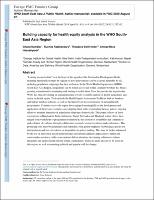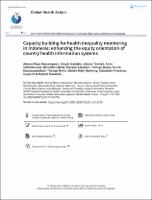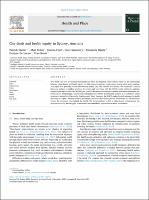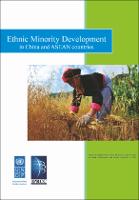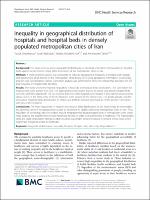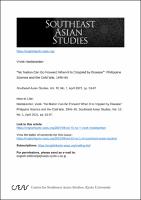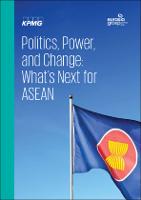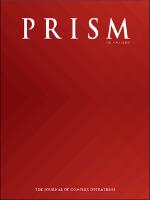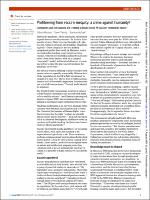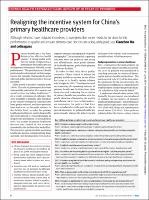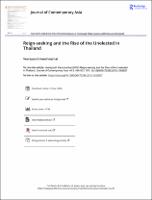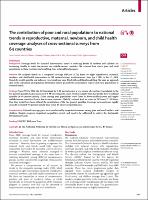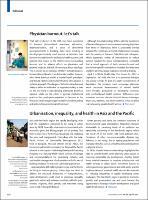Browsing 1.03 Southeast Asia & China Context by Resource Type "journalArticle"
Now showing items 1-13 of 13
-
Building capacity for health equity analysis in the WHO South-East Asia Region
(2019)
Leaving no one behind” is at the heart of the agenda of the Sustainable Development Goals, requiring that health systems be vigilant to how interventions can be accessed equitably by all, including population subgroups that face exclusion. In the World Health Organization (WHO) South-East Asia Region, inequalities can be found across and within countries but there has been a growing commitment to examining and starting to tackle them. Over the past decade in particular, WHO has been developing an armamentarium of tools to enable analysis of health ... -
Capacity building for health inequality monitoring in Indonesia: enhancing the equity orientation of country health information systems
(2018)
Background: Inequalities in health represent a major problem in many countries, including Indonesia. Addressing health inequality is a central component of the Sustainable Development Goals and a priority of the World Health Organization (WHO). WHO provides technical support for health inequality monitoring among its member states. Following a capacity-building workshop in the WHO South-East Asia Region in 2014, Indonesia expressed interest in incorporating healthinequality monitoring into its national health information system. Objectives: This ... -
City deals and health equity in Sydney, Australia
(2022-01)
City Deals’ are new governance instruments for urban development. Vast evidence exists on the relationship between urban factors and health equity, but little research applies a health equity lens to urban policy-making. This paper does precisely that for the Western Sydney City Deal (WSCD) in Australia. We conducted a critical discourse analysis of publicly available documents and interviews with the WSCD’s main architects, applying insights from relevant theories. We find ‘pro-growth’ discourse to encourage economic investment dominates any ... -
Ethnic Minority Development
(2013)
This paper was presented in the sixth China-ASEAN Forum on Social Development and Poverty Reduction, which was held on 26-27 September 2012 in Liuzhou, China. The forum was supported under the UNDP-IPRCC project. Southeast Asia and China together constitute nearly half of the total global ethnic minority population. This chapter will address the challenge of the development of ethnic minority groups in the ASEAN region, and China -
Inequality in geographical distribution of hospitals and hospital beds in densely populated metropolitan cities of Iran
(BMC Health Serv Res, 2019-12)
Background: This study aims to assess geographical distribution of hospitals and extent of inequalities in hospital beds against socioeconomic status (SES) of residents of five metropolitan cities in Iran. Methods: A cross-sectional analysis was conducted to measure geographical inequality in hospital and hospital bed distributions of 68 districts in five metropolitan cities during 2016 using geographic information system (GIS), and Gini and Concentration indices. Correlation analysis was performed to show the relationship between the SES and ... -
“No Nation Can Go Forward When It Is Crippled by Disease”: Philippine Science and the Cold War, 1946–65
(Center for Southeast Asian Studies, Kyoto University, 2021)
This article outlines a notion of postcolonial Philippine science. First, it touches on the links between science, medicine, the Cold War, and nation building. Second, it examines the niche occupied by applied sciences, particularly nutrition, agriculture, and medicine, in nation building. Between 1946 and 1965, Philippine presidents understood science functionally, in terms of harnessing the country’s natural resources for economic development; and strategically, in terms of the Philippines being a regional leader of the free world in Southeast ... -
Politics, Power, and Change
(KPMG)
There are 10 varied and challenging national storylines unfolding in ASEAN – and businesses need to join these conversations. Juggling the many demands of an increasingly complex stakeholder universe – from consumers to politicians, regulators to society at large – will require an understanding of the wide array of domestic and regional political risks in ASEAN. While there are some challenges that are common to many countries in ASEAN, the level of risk and trend direction vary. There are several questions on geo-strategy in the region: Will ... -
PRISM
(the Institute for National Strategic Studies at the National Defense University, 2021)
The global COVID-19 pandemic of 2020-2021 has catalyzed a re-examination of what national security consists of, and what responsibilities the world’s armed forces must or should assume to meet such non-military challenges. Yet the competition between the United States and its adversaries has intensified, requiring that the national security enterprise retain traditional capabilities while keeping up with the fierce pace of technological innovation. PRISM V.9,N.2 authors address the emerging challenges armed forces must meet, offer perspectives ... -
Profiteering from vaccine inequity: a crime against humanity?
(BMJ, 2021-08-16) -
Realigning the incentive system for China’s primary healthcare providers
(BMJ, 2019-06-21) -
Reign-seeking and the Rise of the Unelected in Thailand
(Journal of Contemporary Asia, 2016)
This article develops the concept of “reign-seeking” to capture the unprecedented collective action of the Thai professional and official elite prior to the 2014 military coup and the establishment of a military regime. It argues that this phenomenon reflects broad and deep political dynamics, for which the dominant scholarship on authoritarianism and Thai politics cannot adequately explain. The changing incentives of these supposedly non-partisan actors are interwoven with neo-liberal governance reform driven by a desire for depoliticisation and ... -
The contribution of poor and rural populations to national trends in reproductive, maternal, newborn, and child health coverage: analyses of cross-sectional surveys from 64 countries
(The Lancet Global Health, 2017)
Background Coverage levels for essential interventions aimed at reducing deaths of mothers and children are increasing steadily in most low-income and middle-income countries. We assessed how much poor and rural populations in these countries are benefiting from national-level progress.

